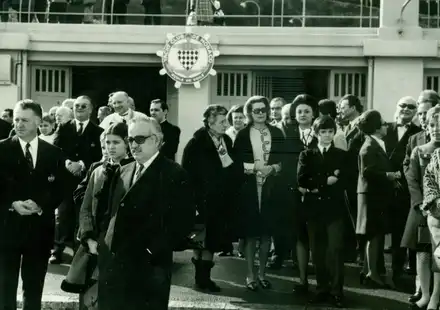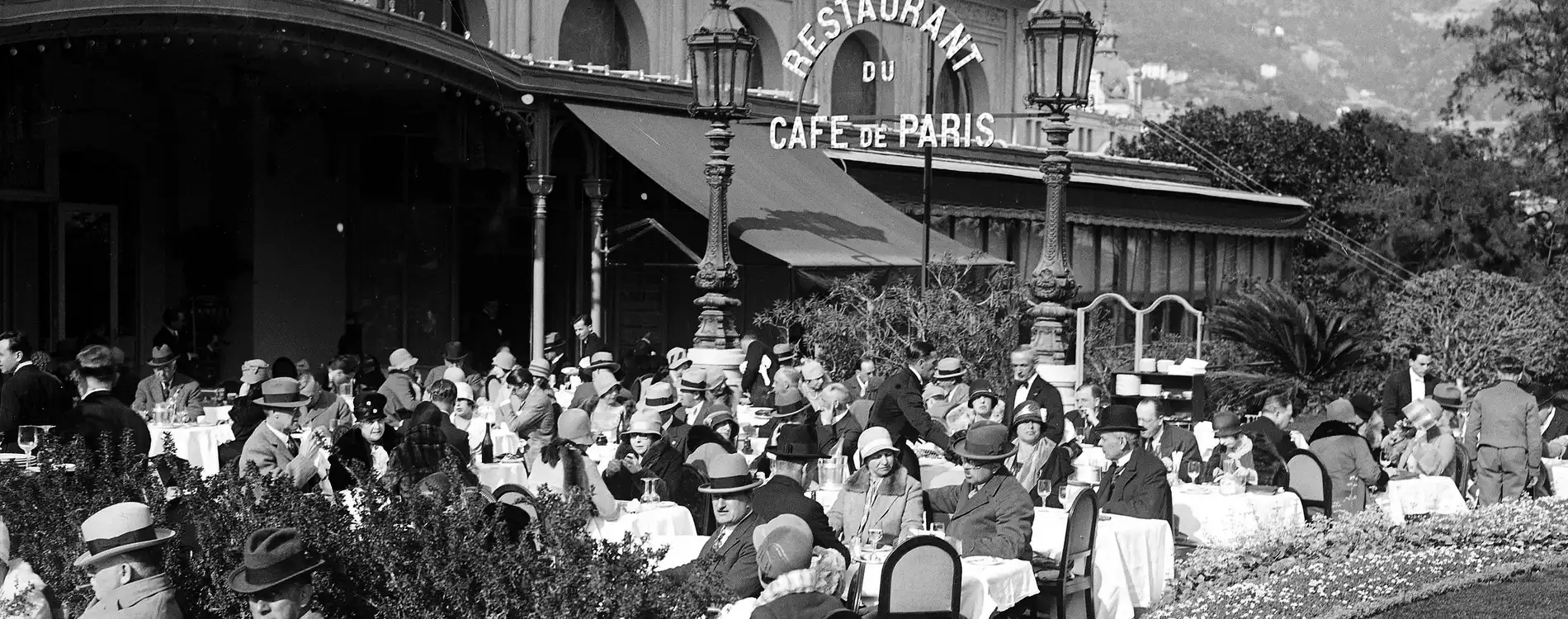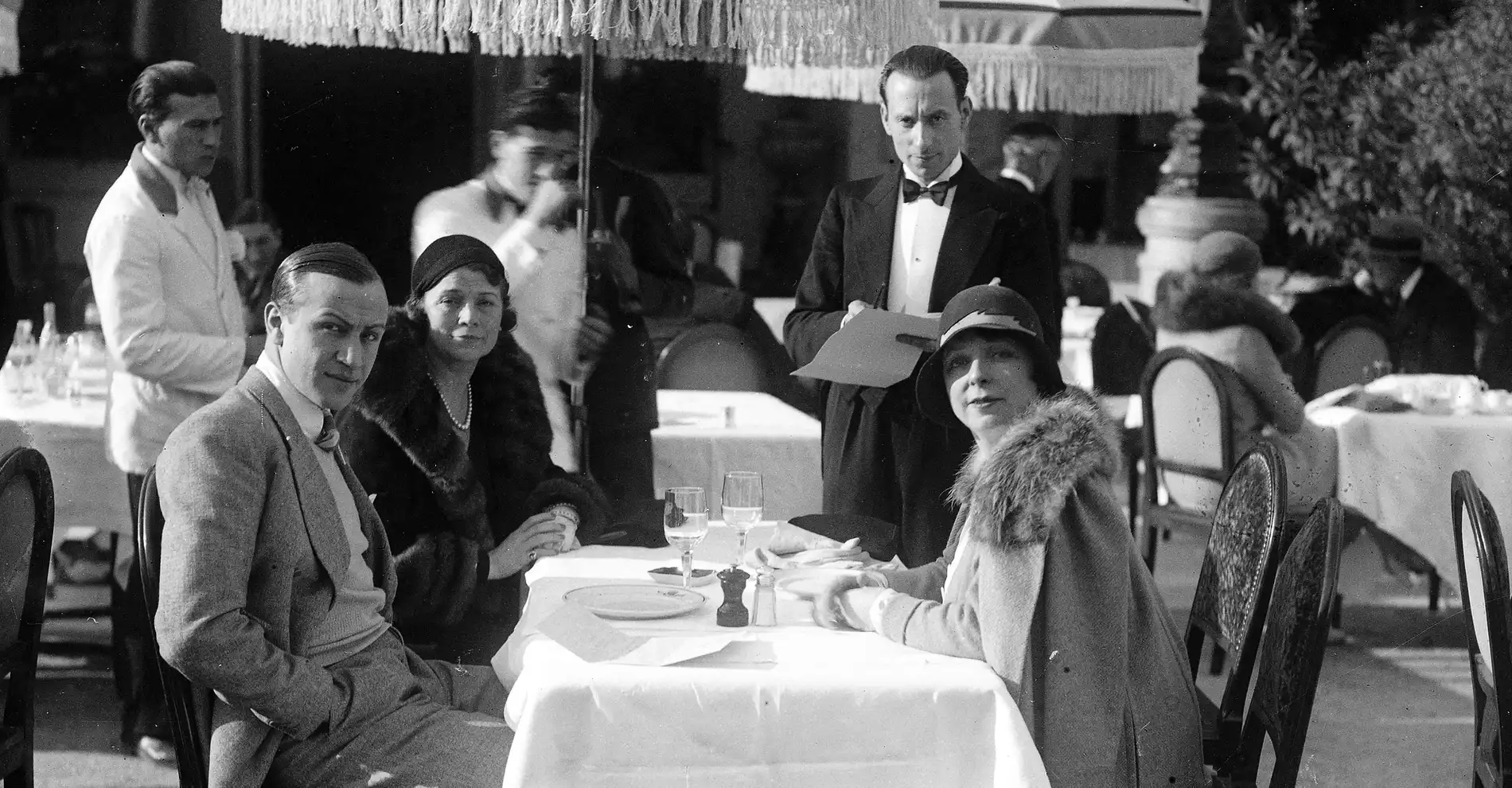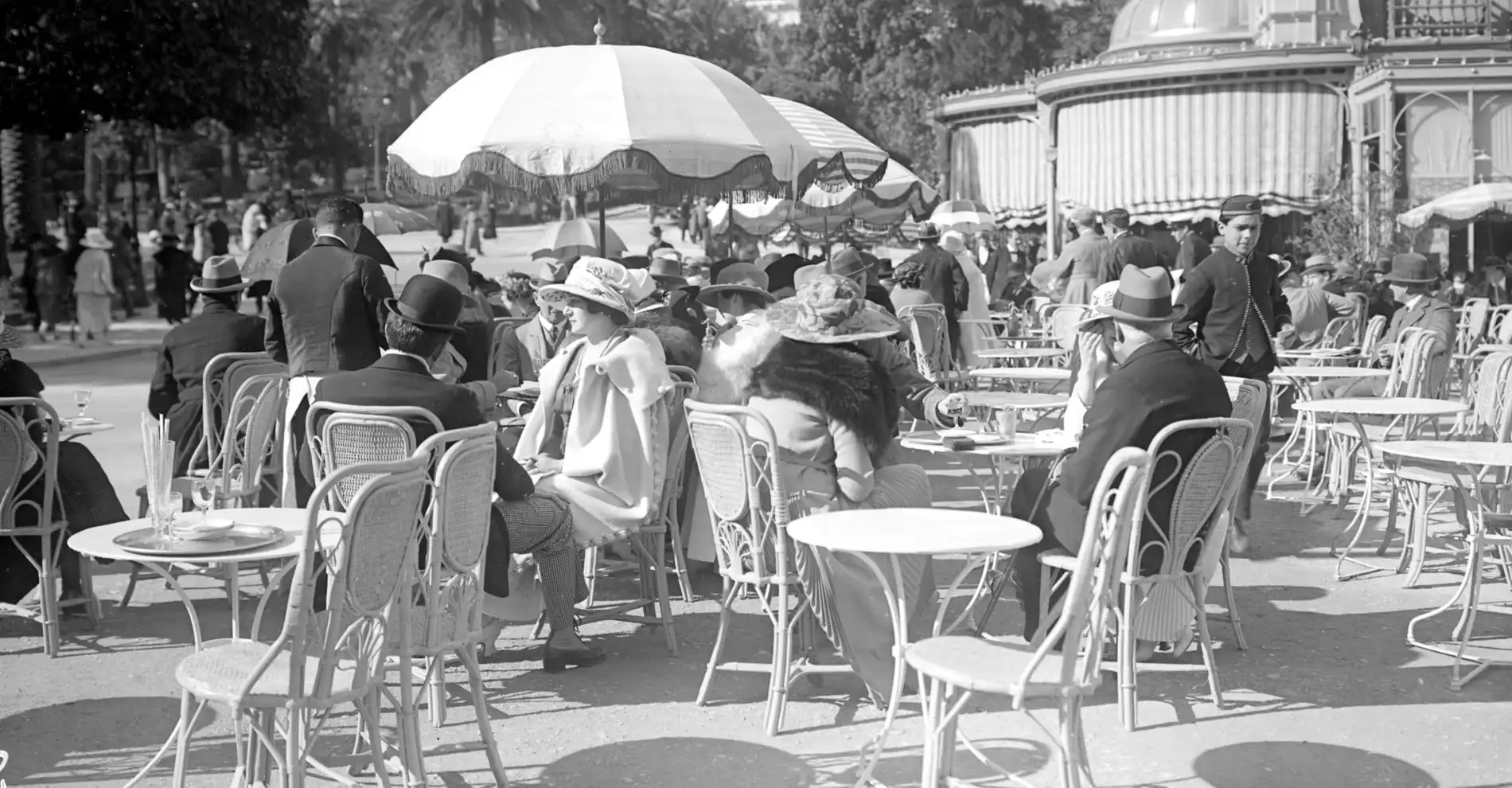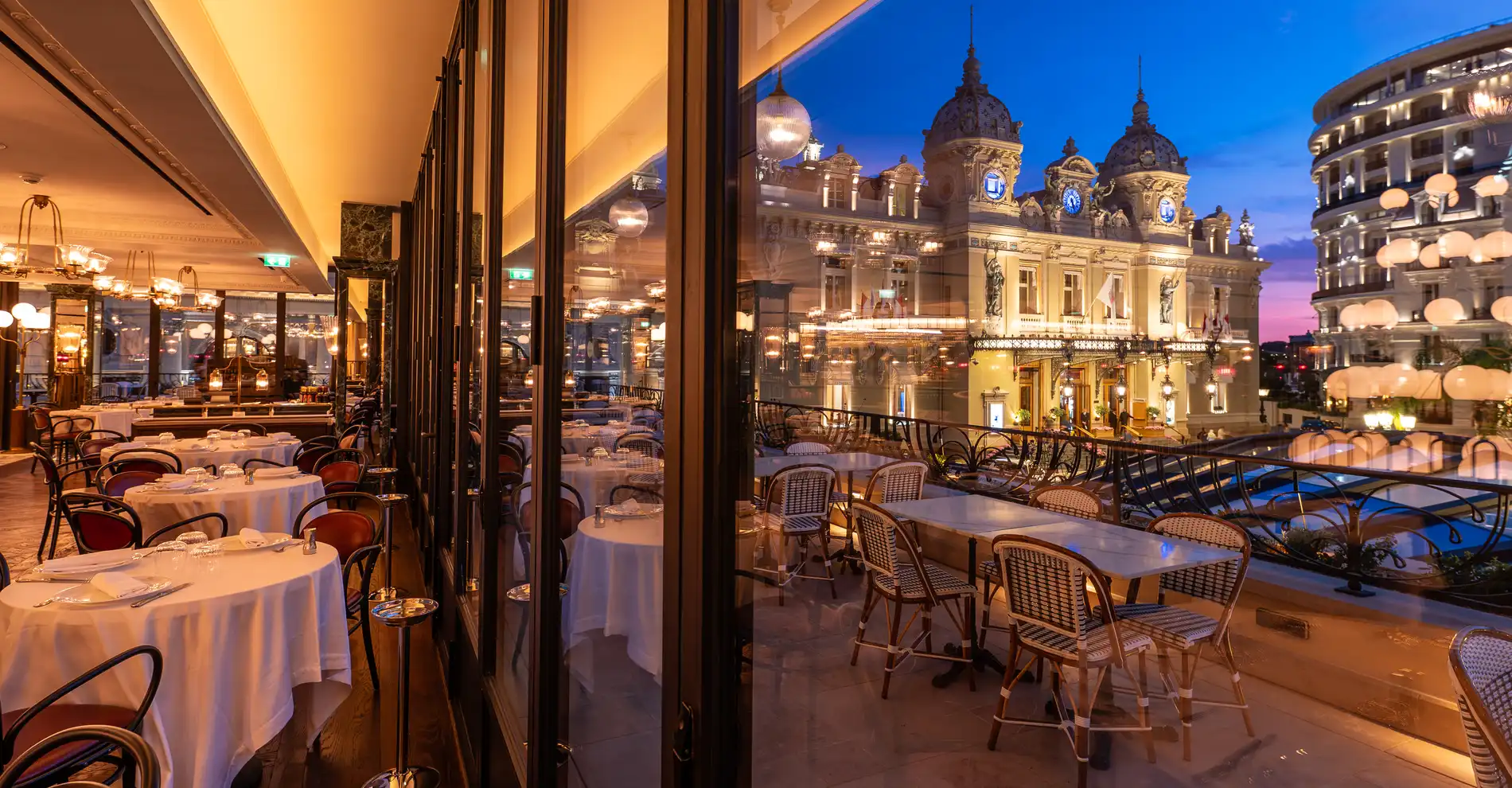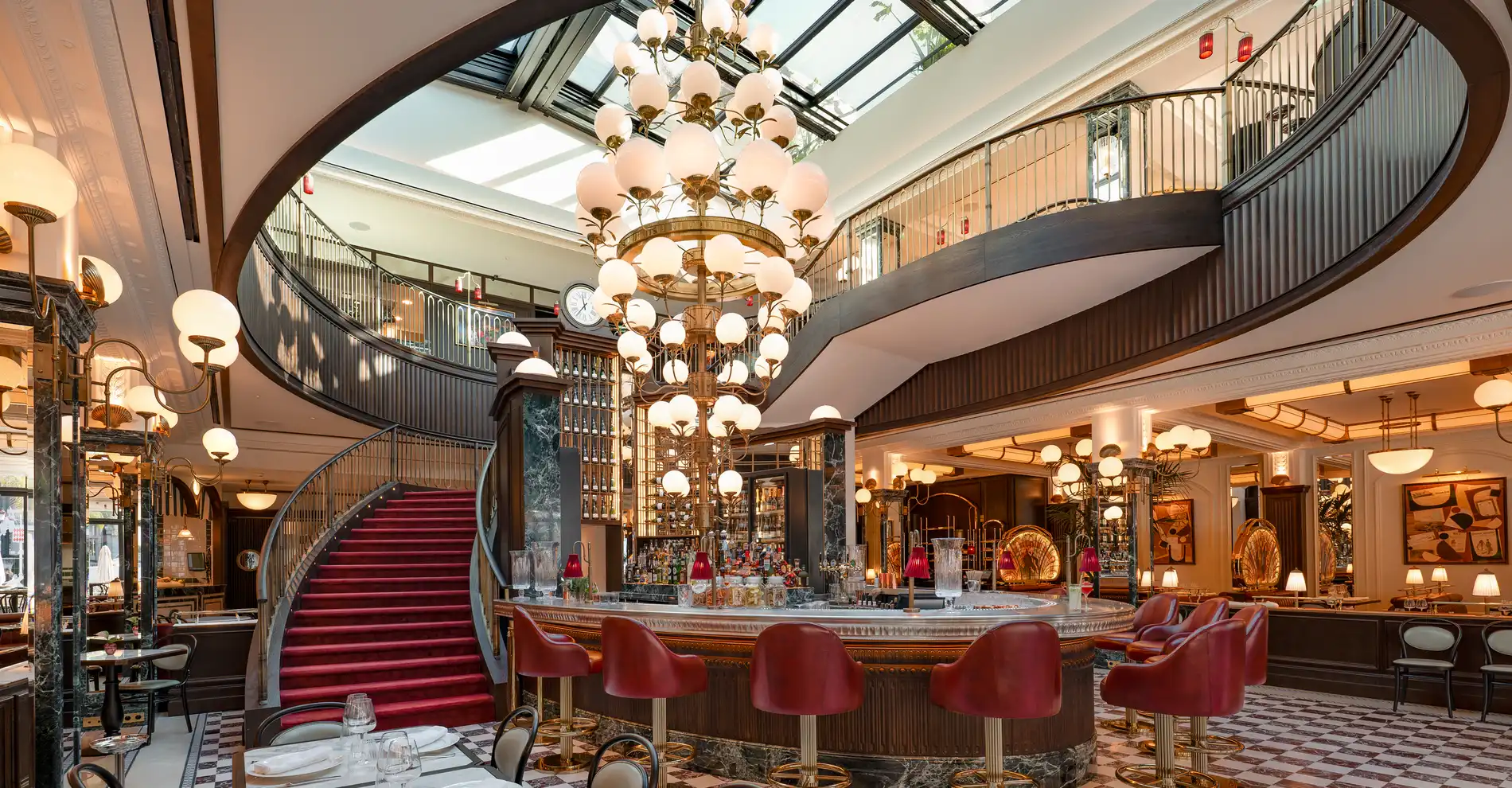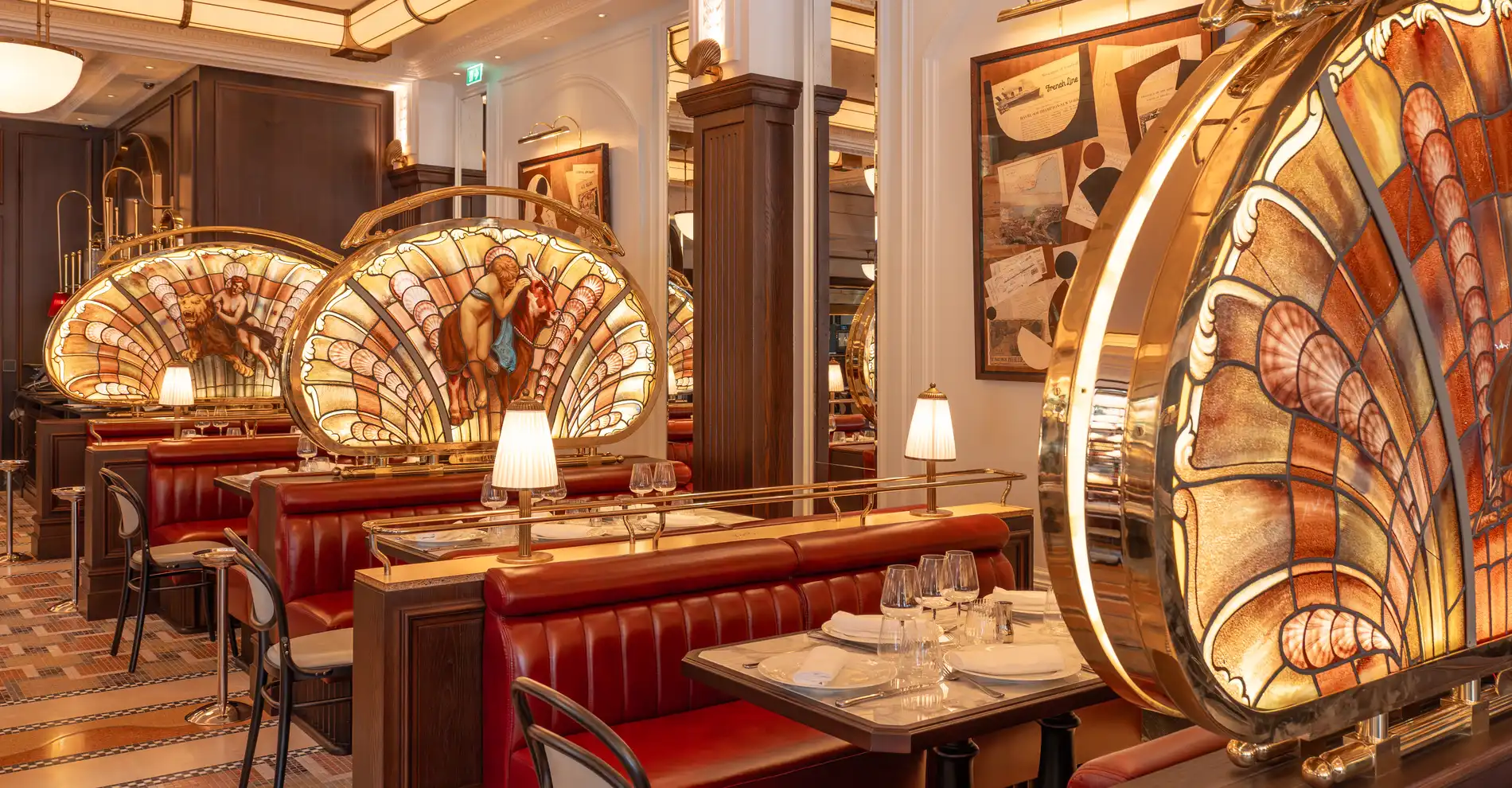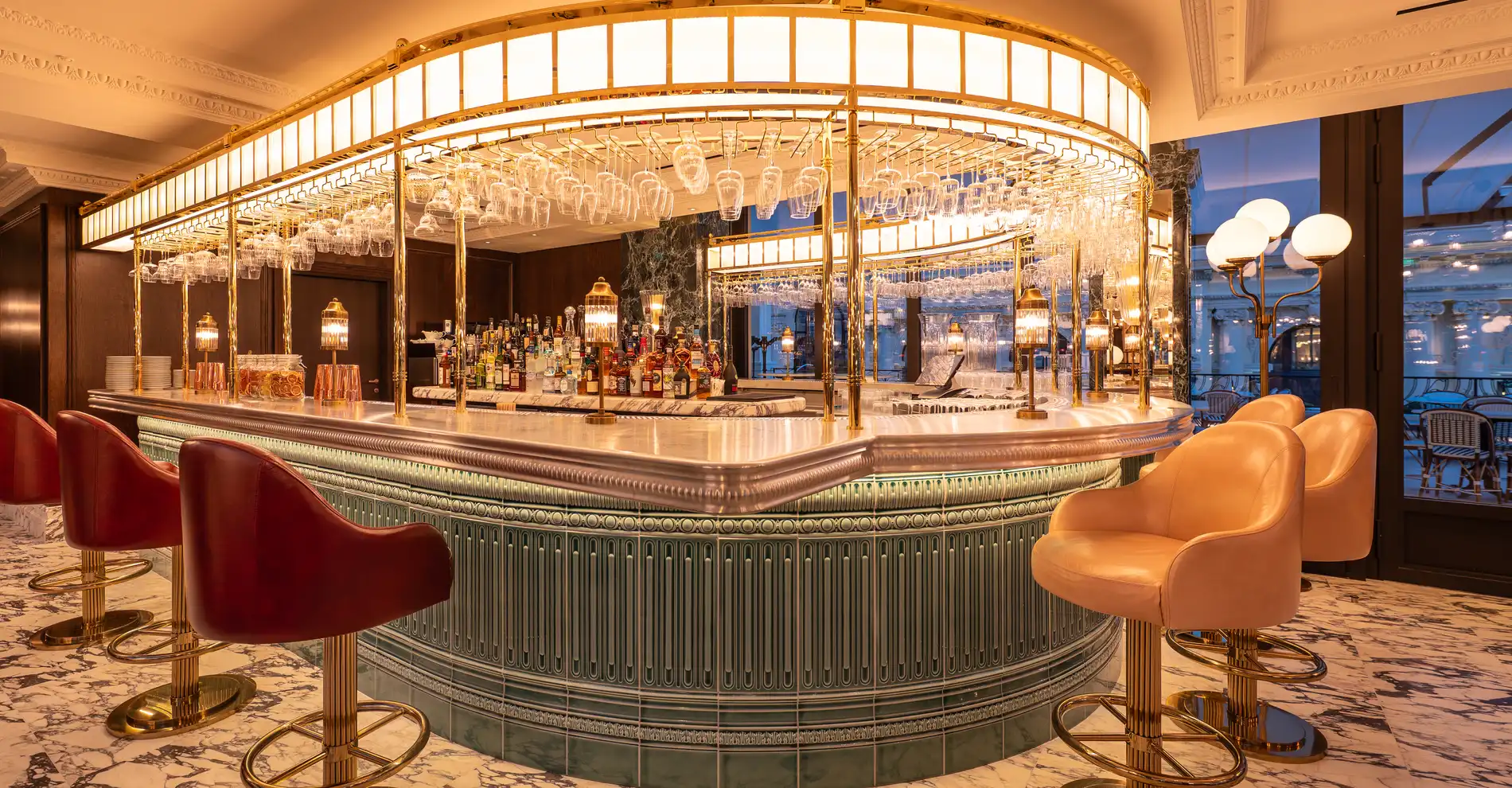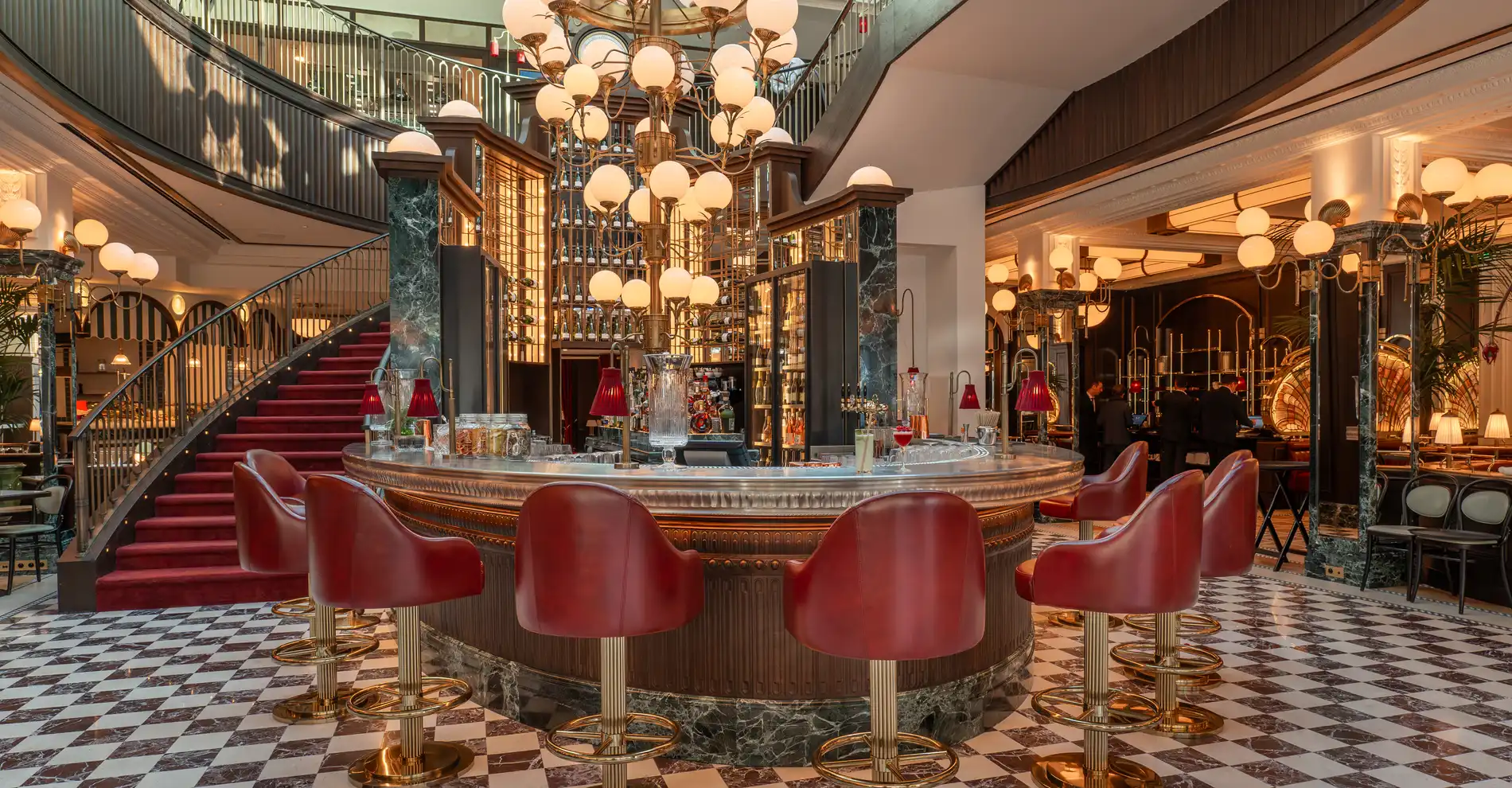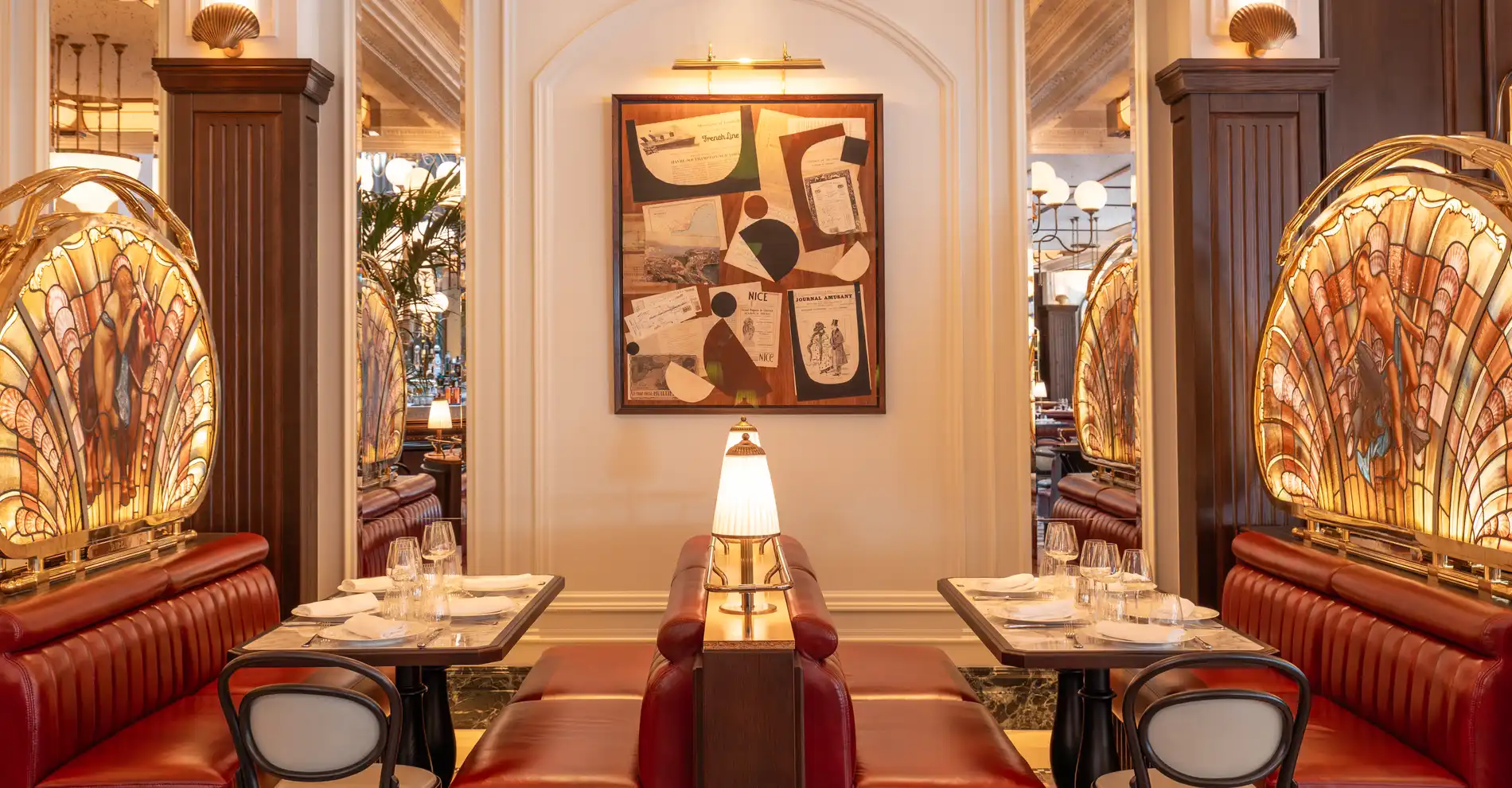Published on October 23, 2023Updated on November 24, 2023
Founded in 1868, the Café de Paris Monte-Carlo , iconic brasserie of the Principality, in the beating heart of Place du Casino, has a rich and elegant story to tell.
For 150 years, the Café de Paris Monte-Carlo has witnessed unforgettable moments, important encounters and memorable celebrations, an unmissable place that hosted celebrities, artists, Monegasques, residents and visitors from all over the world, becoming the symbol of ultimate elegance in Monte-Carlo.
The mythical Café de Paris Monte-Carlo and its fascinating history take us back through the centuries. It all began in January 1868 with the opening of the very first café in Monte Carlo, aptly named "Café Divan".
Zoom in on the highlights and renovations of the Café de Paris Monte-Carlo!
The "Café Divan" became a distant memory.
Inside, a host of services were available to customers, from a cosy café to a small restaurant, from a billiards room to a tobacco kiosk, as well as perfumery and jewellery shops.
The layout, decoration and entertainment were carefully supervised by Madame Blanc, who exhibited Monegasque pottery and works of art there.
A year after it opened, in December 1869, the "Café Divan" was so successful that it was extended and renamed the "Grand Café de Monte-Carlo". Horse-drawn carriages thronged the area, attracting the curious, and the Café de Paris Monte-Carlo was embellished by paintings thanks to Marie Blanc’s love of art.
-1.jpg.webp?h=e0658492&itok=1nef21cX)
The most aristocratic brasserie of the 1900s
In August 1870, a new façade appeared, but it was not until 1882 that a new building replaced the chalet built in 1868. The name "Café de Paris" now graced its pediment. This new Café de Paris Monte-Carlo was the luxurious counterpart to its neighbour, the Hôtel de Paris Monte-Carlo.
Its architecture, with Garnier-style stained glass windows, boutiques, a cigar cellar and a perfumery, made it the vibrant heart of Monte Carlo, the first port of call for visitors to the Principality, and a popular Sunday destination for residents of the Côte d'Azur.
From Nice to Cannes, people came to enjoy the creamy hot chocolate, crêpes Suzette, Munich beer and much more. The Café de Paris Monte-Carlo became a haunt for the celebrities of the day.
Between 1890 and 1893, the international clientele began to call the Café de Paris Monte-Carlo the "American Bar and Grill Room" or "Leo's Bar", in tribute to its manager, Léo Engel.
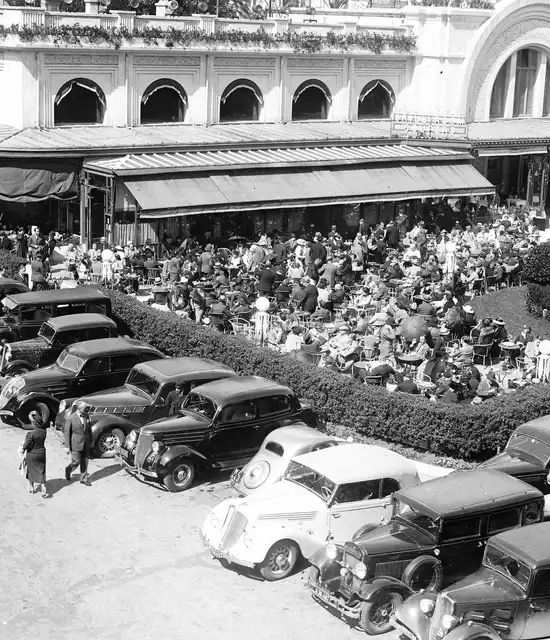
A fashionable Moorish look
In 1897, architect Henri Schmit drew inspiration from the Orient and Africa, adorning the site with minarets and domes. The walls were decorated with brightly-coloured earthenware friezes, recalling the motifs on the façade of the Casino de Monte-Carlo. An elegant gallery with a wrought-iron balustrade surrounded the café. Schmit designed it to be elegant and unpretentious, a real gem.
In 1913, one of the café's rooms was transformed with great pomp and artistry, inspired by the grandiose style of Louis XIV. The architect, Léon Blois, demolished the old dining room to create an immense lounge, resplendent in beauty and bathed in light, worthy of Monte Carlo.
In the 1930s, Art Deco triumphed in Paris and influenced Monte Carlo. The Café de Paris Monte-Carlo followed the trend by adopting a Byzantine style, abandoning the minarets. Coloured earthenware gave way to friezes decorated with rosettes inspired by the new decorative art.
New facilities
During the Second World War, the terrace was transformed into a stage with backstage areas, hosting jazz symphony orchestras, theatrical performances and ballets.
After the war, in 1960, major changes were made. The game of bowling was coming into fashion, so a bowling alley and a Scotch Club, a Scottish-style nightclub with an unexpected chess set on the ceiling, were installed. Unfortunately, the bowling alley was destroyed by a fire in 1964.
In 1962, the Drugstore appeared, proposing perfume, tobacco, newspapers and souvenirs, recalling the atmosphere of 1868. Only the billiards table has disappeared, but the chrome of the automatic gaming machines continued to shine.
On 2 March 1987, the Café de Paris Monte-Carlo closed its doors for an 18-month renovation period. A temporary café in Saint-James Square was open to customers during this period.
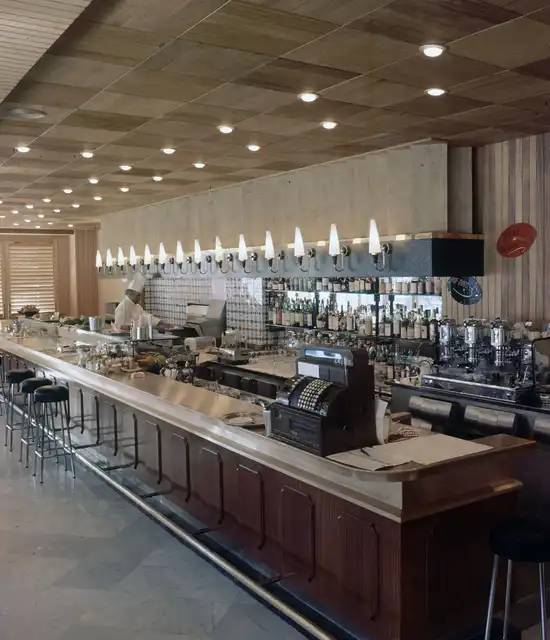
120 Years of History and Renewal
On 21 July 1988, the new Café de Paris Monte-Carlo, the fifth in its lineage, was inaugurated by Prince Rainier. This Café de Paris Monte-Carlo had rediscovered its youthful character and celebrated its 120th anniversary with dignity.
The reconstruction of the building erected in 1897 enabled the establishment to be extended by 2,000m², giving a total surface area of 9,600m², including terraces. The lobby is an extension of the Place du Casino, bathed in light thanks to a large glass roof and adorned with pink and pink-beige marble walls.
The Drugstore is open from 7.30am to 2am, and the Coffee-shop offers a bar and light food service from 8am to 5am, in a warm, contemporary style.
The automatic machines room houses 300 machines from 10am to 5am, while the large games room offers American roulette, craps and blackjack from 4pm to 5am.
The brasserie, typical of the 1900s, has an indoor restaurant seating 240, open from 11.30am to 2am, decorated with stained glass windows representing the signs of the zodiac and the four seasons.
The mahogany and copper furnishings add to its charm. The Parisian and public terraces offer 90 and 350 places respectively, with a pergola, a bandstand and a drinks service. The terrace lounge on the first floor is ideal for private meals, cocktails and receptions.
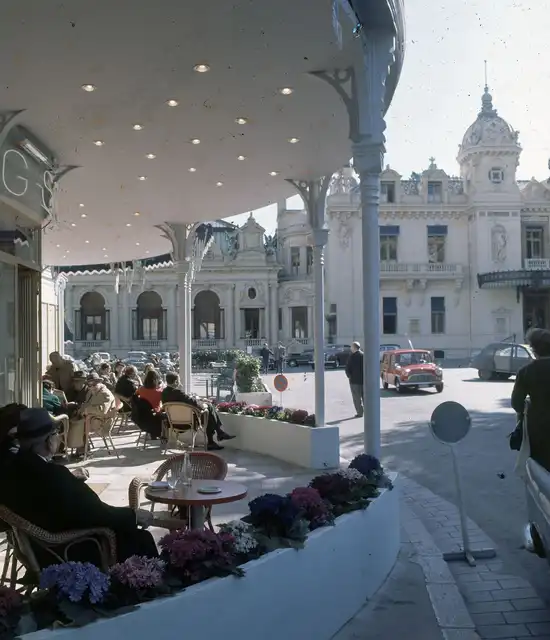
Marie Blanc, pioneer of the Café de Paris Monte-Carlo
It should also be noted that when the Café Divan was created in 1868, the Hôtel de Paris Monte-Carlo had no bar or café. Opposite the hotel, on the other side of Place du Casino, were sheds and stables for stagecoaches, horse-drawn carriages and horses.
It was Marie Blanc who had the Café Divan, now the Café de Paris Monte-Carlo, built in place of the stables. Her ambition was to turn it into a refined, slightly snobbish place offering unique services and experiences.
Marie Blanc was responsible for the layout, decoration and entertainment. She exhibited Monegasque pottery and paintings there.
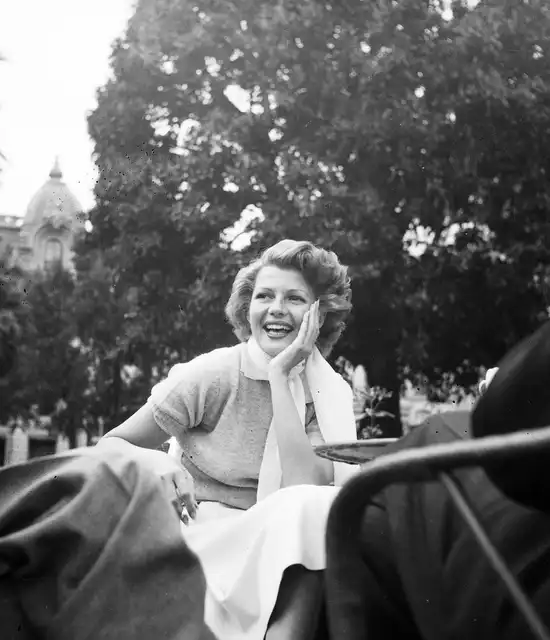
A true emblem of Monte Carlo
The café featured a coffee lounge, a small restaurant, a billiards room, a tobacco kiosk and a perfumery called "Parfumerie du Soleil".
The latter was particularly dear to Marie Blanc, who offered elixirs designed by the renowned chemist Monsieur Delpy, bearing names as modest as "Bouquet Impérial" or "Reine d'Angleterre", produced by the Société Industrielle et Artistique.
Thus, the Café de Paris Monte-Carlo has stood the test of time with elegance and refinement, blending history, culture and art in the heart of the Principality.
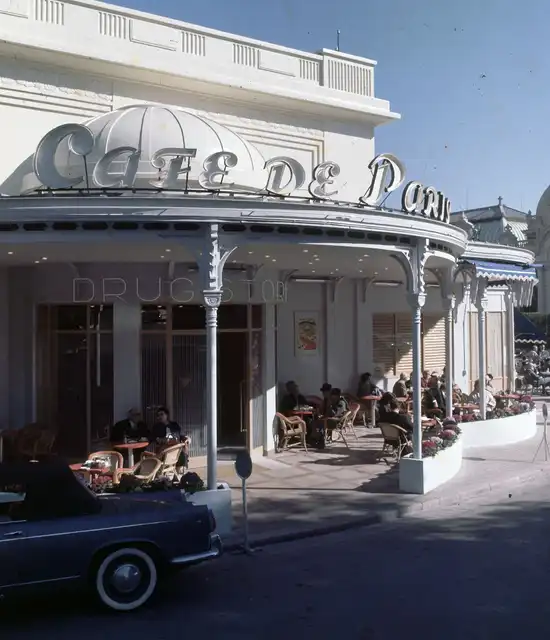
And the story continues!
On 14 November 2023, after just over a year and a half of renovation work, the Café de Paris will reopen its doors in a modern, contemporary style, designed by Studio David Collins. At the helm of this major transformation were two great architects, the Monegasque Alexandre Giraldi and the Frenchman Alain-Charles Perrot. In this new-generation Café de Paris Monte-Carlo, Monaco’s most famous and well-loved brasserie extends over the ground and first floors, with a 280 m² rooftop terrace. As for the interior design, it respects the style and atmosphere of the brasserie, and the heritage features have been reintegrated into the project.
Acknowledgements
It is thanks to the expertise and passion of Charlotte Lubert, Heritage Officer, that we are able to retrace with such precision and eloquence the captivating moments in the history of the Café de Paris Monte-Carlo and the history of the Société des Bains de Mer.
Her unwavering dedication to preserving and telling the rich history of this iconic establishment makes every detail a living testimony, enabling the cultural and heritage legacy of the Café de Paris Monte-Carlo to be preserved and shared in an exceptional way...
Find out more:
The cinematic Art in Monaco: 1960s films shooting
This season, the biggest stars from the 1960s are showcased at the Monte-Carlo Société des Bains de Mer and its palaces through the many films that have been made in this stunning place.
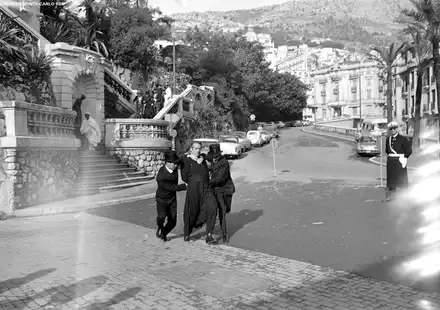
150 years of history and savoir-faire at the Hôtel de Paris Monte-Carlo Wine Cellars
It may be 150 years old, but the wine cellar is just as fascinating as it always has been, and magical stories emerge from this captivating underground vault beneath the luxury Hôtel de Paris Monte-Carlo. Travel back in time as we explore the cellar.
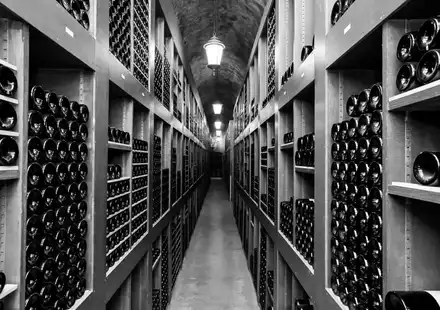
Monaco Yacht Club : 70 years of history!
70 years of sea's luxury: celebrations at the Monaco Yacht Club. Immerse yourself in the fascinating history of this iconic club.
